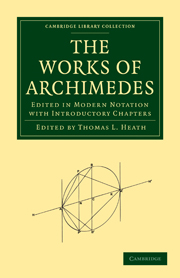Book contents
- Frontmatter
- PREFACE
- LIST OF THE PRINCIPAL WORKS CONSULTED
- Contents
- INTRODUCTION
- CHAPTER I ARCHIMEDES
- CHAPTER II MANUSCRIPTS AND PRINCIPAL EDITIONS—ORDER OF COMPOSITION—DIALECT—LOST WORKS
- CHAPTER III RELATION OF ARCHIMEDES TO HIS PREDECESSORS
- CHAPTER IV ARITHMETIC IN ARCHIMEDES
- CHAPTER V ON THE PROBLEMS KNOWN AS ΝΕΥΣΕΙΣ
- CHAPTER VI CUBIC EQUATIONS
- CHAPTER VII ANTICIPATIONS BY ARCHIMEDES OF THE INTEGRAL CALCULUS
- CHAPTER VIII THE TERMINOLOGY OF ARCHIMEDES
- THE WORKS OF ARCHIMEDES
CHAPTER VIII - THE TERMINOLOGY OF ARCHIMEDES
Published online by Cambridge University Press: 07 September 2010
- Frontmatter
- PREFACE
- LIST OF THE PRINCIPAL WORKS CONSULTED
- Contents
- INTRODUCTION
- CHAPTER I ARCHIMEDES
- CHAPTER II MANUSCRIPTS AND PRINCIPAL EDITIONS—ORDER OF COMPOSITION—DIALECT—LOST WORKS
- CHAPTER III RELATION OF ARCHIMEDES TO HIS PREDECESSORS
- CHAPTER IV ARITHMETIC IN ARCHIMEDES
- CHAPTER V ON THE PROBLEMS KNOWN AS ΝΕΥΣΕΙΣ
- CHAPTER VI CUBIC EQUATIONS
- CHAPTER VII ANTICIPATIONS BY ARCHIMEDES OF THE INTEGRAL CALCULUS
- CHAPTER VIII THE TERMINOLOGY OF ARCHIMEDES
- THE WORKS OF ARCHIMEDES
Summary
So far as the language of Archimedes is that of Greek geometry in general, it must necessarily have much in common with that of Euclid and Apollonius, and it is therefore inevitable that the present chapter should repeat many of the explanations of terms of general application which I have already given in the corresponding chapter of my edition of Apollonius' Conies. But I think it will be best to make this chapter so far as possible complete and selfcontained, even at the cost of some slight repetition, which will however be relieved (1) by the fact that all the particular phrases quoted by way of illustration will be taken from the text of Archimedes instead of Apollonius, and (2) by the addition of a large amount of entirely different matter corresponding to the great variety of subjects dealt with by Archimedes as compared with the limitation of the work of Apollonius to the one subject of conies.
One element of difficulty in the present case arises out of the circumstance that, whereas Archimedes wrote in the Doric dialect, the original language has been in some books completely, and in others partially, transformed into the ordinary dialect of Greek. Uniformity of dialect cannot therefore be preserved in the quotations about to be made; but I have thought it best, when explaining single words, to use the ordinary form, and, when illustrating their use by quoting phrases or sentences, to give the latter as they appear in Heiberg's text, whether in Doric or Attic in the particular case.
- Type
- Chapter
- Information
- The Works of ArchimedesEdited in Modern Notation with Introductory Chapters, pp. clv - clxxxviPublisher: Cambridge University PressPrint publication year: 2009First published in: 1897



